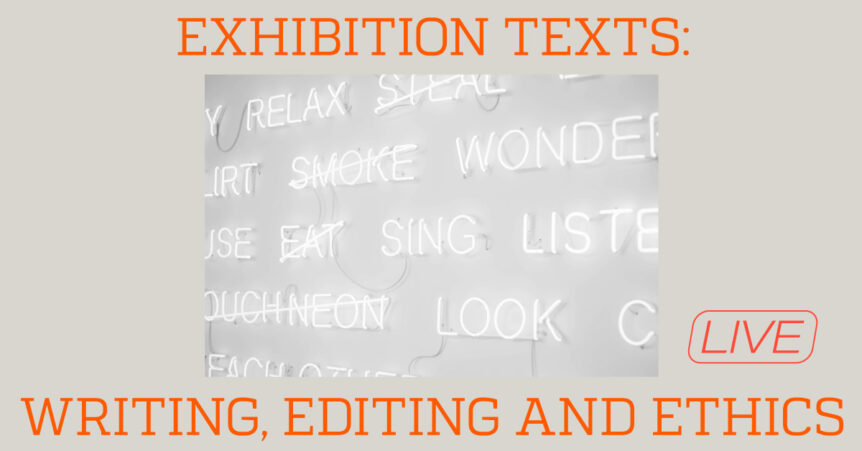Exhibition Texts: Writing, Editing and Ethics
with Joe Rowley
Duration: May 10 – Jun 7, 2022
Schedule: 2 hrs/week
Enrollment deadline: May 6, 2022
Exhibition texts are vital tools in supporting an audience’s understanding of an exhibition, artwork or artist. This course is a practical guide for improving your skills in producing exhibition texts and editing texts received from artists or collaborators. Additionally, this course considers the responsibilities curators have in producing sources of information for audiences and representing the practice of artists.
The course will start out by presenting strategies and standards for structuring texts aimed at different types of audience. We will use the Paddlers, Swimmers and Divers model as a guide through the course to help us shape our texts. We will learn how to embrace and make use of the flexibility of language, considering it in new ways while staying true to our own voice.
The course will consider the ethical responsibilities we have as knowledge producers, interpreters and conveyors for audiences. Alongside this, we have a responsibility to the artists and collaborators we work with to ensure that they are being presented and heard in the ways they want to be. Finally, we will consider the responsibility we have to ourselves in terms of time management, energy and self-representation.
By the end of the course, you will have developed new skills, techniques and confidence in writing, collated a set of resources to help in text production and editing and have created a selection of texts in your own voice which you can refer back to for years to come.
Program
Week 1: Introduction
Week 2: Writing
- Paddlers, Swimmers & Divers
- What have we written and how have we written it?
- What do we like and dislike in text?
- An introduction to Paddlers, Swimmers and Divers
- How do you want your voice to sound?
- Complexity / Simplicity in text
- How can/do we as writers and editors convey complex ideas effectively in simple ways?
- How can/do we as writers and editors deal with terms that can’t be simplified?
Week 3: Editing
- Language, Structure & Feel
- Self-editing strategies and tools
- Collaborative editing strategies and tools
- Language, Structure and Feel
- Flexibility in language: How is language formed, where does it come from and who controls it?
- English as lingua franca: transferability of these skills and thoughts to other languages
- How can/do we as writers and editors edit texts from artists or other collaborators in responsible yet understandable ways
- Maintaining the writer’s voice during the editorial process
- Citation, footnotes and “designed text”
- Proofreading
Week 4: Ethics
- Audience, Collaborators & Self – How have our views shifted?
- Multiple languages and the question of translation
- Content warnings
- How are we talking to our audience and how does that make them feel?
- Working processes with collaborators
- What are our responsibilities to them?
- The role of critique
- Vulnerability and support
- Time management – avoiding stress and mistakes
- Commitment to maintaining our voice
Week 5: Peer Review
For more information, please refer to the website of organisation.

